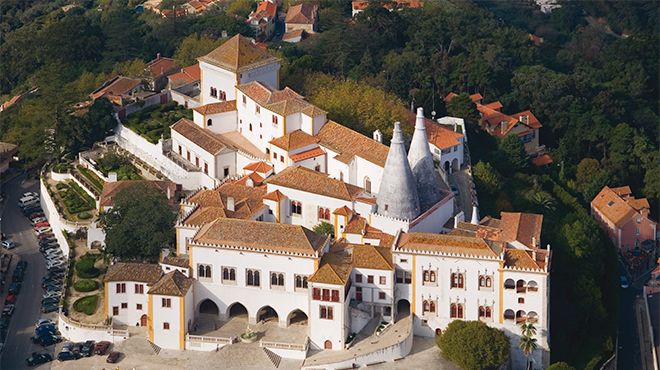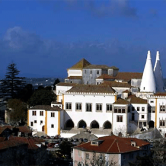Palácio Nacional de Sintra

Museums and Palaces
Sintra National Palace
The Sintra national palace is unique amongst the royal mediaeval palaces in Portugal and the town’s most distinctive building.
Beginning with the nation’s first dynasties, Sintra was one of the preferred places of Portuguese kings and queens, although the palace that we can see nowadays owes its existence to an initiative of Dom João I, who rebuilt it, and Dom Manuel I, who enriched the building’s decorative character and added a new wing.
It is worth visiting the interior of the palace, where you will certainly find out a little more about the history of Portugal. The decoration is quite remarkable, being a combination of various artistic styles that depended on the respective tastes of the kings that lived here, and carried out in such a way as to give different names to the various rooms. In particular, the attention of visitors is drawn to the Sala dos Cisnes (Swans’ Room), the Sala dos Brasões (Armoury), the Sala das Pegas (Magpie or Reading Room) and the chapel.
Here you can also find a brief history of the development of the decorative tile (azulejo) in Portugal, with examples ranging from the Spanish-Moorish tiles brought by the king Dom Manuel to the typical blue-and-white tiles of the 18th century.
Outside, the most striking and distinctive feature of the palace is the two large conical chimneys of the kitchen, each measuring 33 metres high, now adopted as the symbol of Sintra.
2710-616 Sintra
- Partial
- Toilets
- Hearing impairment
- Visual impairment
- Hearing impairment
Guided tours are available for people with special needs, by prior appointment.
The visit route in the Sintra National Palace has been changed to better accommodate people with special needs. Accessibility solutions have been installed that include removable equipment such as ramps, and fixed and reversible equipment such as platform lifts, to ensure that the spaces retain their characteristics.
The main entrance has several stair landings, which make it inaccessible for people with impaired mobility. These visitors are advised to enter through the Palace kitchen, where a ramp can be installed. From here you can access the Manueline Room and then visit the rest of the Palace.





 Explore
Explore 
 Remember and Share
Remember and Share 


